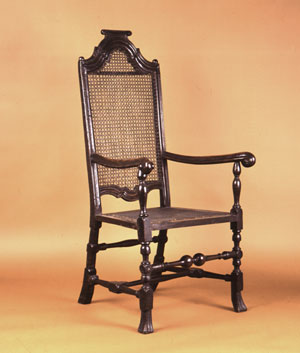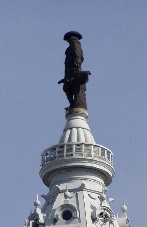CONSULTA LINK
PERSONAGGI
http://www.ushistory.org/navigation/people.html
AMERICAN BATTLEFIELD
Fondatore della Pennsylvania, William Penn (junior) nacque il 14 ottobre 1644 a Londra, figlio di Margaret Jasper e del famoso ammiraglio Sir William Penn (senior) (1621-1670), conquistatore di Giamaica nel 1655, e altamente stimato come Commissario della Flotta sia dal re Carlo II (1649-1685) che dal figlio, il duca di York e futuro re Giacomo II (1685-1688).
P. frequentò l’università di Oxford, al Christ Church College, dove fu convertito al quaccherismo da John Owen, un discepolo di George Fox. Tuttavia questa conversione aumentò una sua aggressività e insofferenza verso le istituzioni anglicane a tal punto che fu espulso dall’università.
Saputo dell’accaduto, l’ammiraglio Penn punì il figlio ribelle con una solenne battuta e buttandolo fuori casa, ma in seguito lo perdonò inviandolo nel 1666 in Irlanda ad amministrare i terreni e le proprietà di famiglia. Tuttavia, al suo rientro in Inghilterra, P. trovò la maniera di litigare nuovamente con il padre a causa della sua usanza quacchera di non levare il cappello davanti a nessuno, neppure davanti al re d’Inghilterra!
Nel 1668 P. fu rinchiuso nella famigerata Torre di Londra per aver pubblicato un lavoro, nel quale egli attaccava la dottrina della Trinità e la giustificazione per fede. In carcere scrisse i suoi libri più famosi No Cross, No Crown (nessuna croce, nessuna corona) e Innocency with her open face (innocenza con la sua faccia manifesta).

Due anni dopo il padre morì, lasciandolo erede di una tenuta e di crediti verso la Corona per £16.000. Eppure P. continuò la sua missione e visitò, suo malgrado, ancora la Torre di Londra nel 1671, quando fu arrestato per predicazione non autorizzata. Durante il relativo processo, da buon quacchero, P. si rifiutò di giurare, e fu perciò rinchiuso nella prigione di Newgate per sei mesi.
Nel 1672, al ritorno di un viaggio in Germania e Olanda assieme a George Fox, P. si sposò con Gulielma Maria Springett e dal 1675 aumentò il suo interesse verso le nuove colonie americane. Aiutò, infatti, i nuovi coloni quaccheri a tracciare le concessioni e gli accordi necessari per stabilirsi nel territorio del New Jersey occidentale.
Nel 1681 egli rilevò, con alcuni soci, un vasto territorio equivalente all’attuale New Jersey orientale da un quacchero che aveva fatto bancarotta e nello stesso anno, egli convertì i suoi crediti con il re d’Inghilterra nella concessione di un territorio a nord del Maryland, che egli dapprima battezzò Sylvania, cambiando poi il nome, dietro sollecitazione del re Carlo II in persona, in Pennsylvania in onore del padre.
Nel 1682, a bordo della nave Welcome, egli si trasferì nel suo territorio americano, di cui fu nominato governatore, e fondò la città di Philadelphia, in altre parole Città dell’Amore fraterno, massima rappresentazione di quella tolleranza religiosa che P. desiderava applicare nei confronti di qualsiasi religione. Anche nei confronti degli indiani locali, i Delaware, P. fu molto corretto, acquistando il territorio da loro in un accordo siglato il 30 novembre 1862 sotto un grande olmo a Shackamaxon.

La sua colonia fu terra di libertà sia per i quaccheri sia per altre sette non-conformiste perseguitate ed anche in patria egli s’impegnò per la libertà religiosa, riuscendo a far liberare più di 1.200 quaccheri, grazie all’antica amicizia del padre con il re Giacomo II, quando questi era ancora il Duca di York. Nel 1687 P. ringraziò pubblicamente, il re, in nome dei quaccheri, per la dichiarazione di indulgenza, emanata in quell’anno.
Fu quindi abbastanza scontato che, a causa dei rapporti amichevoli con l’ex re, con la salita al potere di Guglielmo III d’Orange (1689-1702) nel 1689, P. fosse accusato diverse volte di tradimento e cospirazione, ma fu sempre assolto: tuttavia nel 1692 gli fu revocato il titolo di governatore della Pennsylvania. Una sua imprudenza, visto l’accanimento sopra descritto contro la sua persona, fu la partecipazione ai funerali di George Fox nel 1691, quando evitò, per un pelo, di essere arrestato.
Alla morte della prima moglie nel 1694, egli si risposò con Hannah Callowill e nel 1699 si recò nuovamente in Pennsylvania, che trovò in eccellenti condizioni economiche e dove emanò la Charter of Privileges (la carta dei privilegi) nel 1701.
Non altrettanto floride furono però le sue proprietà in Inghilterra: infatti tornato nel 1701, si trovò letteralmente in bancarotta a causa della disonestà del suo amministratore, un tale Ford e dovette patire la galera nel 1707/8 per debiti.
Fu liberato per intercessione di amici potenti, ma visse gli ultimi anni in miseria, preoccupato sia per le notizie d’oltreoceano, non sempre positive, sulla sua colonia che per i continui problemi creati dal figlio maggiore.
Tutte queste preoccupazioni gli provocarono nel 1712 un ictus, nella cui condizione di forte menomazione P. rimase fino alla morte avvenuta il 30 luglio 1718 a Ruscombe, nella contea del Berkshire.
CONSULTA LINK
http://www.ushistory.org/penn/fox.
William Penn (October 14, 1644–July 30, 1718) founded the Province of Pennsylvania, the British North American colony that became the U.S. state of Pennsylvania. The democratic principles that he set forth served as an inspiration for the United States Constitution. Ahead of his time, Penn also published a plan for a United States of Europe, “European Dyet, Parliament or Estates.”
Religious beliefs
Although born into a distinguished Anglican family and the son of Admiral Sir William Penn, Penn joined the Religious Society of Friends or Quakers at the age of 22. The Quakers obeyed their “inner light”, which they believed to come directly from God, refused to bow or take off their hats to any man, and refused to take up arms. Penn was a close friend of George Fox, the founder of the Quakers. These were times of turmoil, just after Cromwell’s death, and the Quakers were suspect, because of their principles which differed from the state imposed religion and because of their refusal to swear an oath of loyalty to Cromwell or the King (Quakers obeyed the command of Christ to not swear, Matthew 5:34).

Penn’s religious views were extremely distressing to his father, Admiral Sir William Penn, who had through naval service earned an estate in Ireland and hoped that Penn’s charisma and intelligence would be able to win him favor at the court of Charles II. In 1668 he was imprisoned for writing a tract (The Sandy Foundation Shaken) which attacked the doctrine of the trinity.
“If thou wouldst rule well, thou must rule for God, and to do that, thou must be ruled by him….Those who will not be governed by God will be ruled by tyrants.” –William Penn
Penn was a frequent companion of George Fox, the founder of the Quakers, travelling in Europe and England with him in their ministry. He also wrote a comprehensive, detailed explanation of Quakerism along with a testimony to the character of George Fox, in his Introductionto the autobiographical Journal of George Fox.
Persecutions
Penn was educated at Chigwell School, Essex where he had his earliest religious experience. Thereafter, young Penn’s religious views effectively exiled him from English society — he was sent down (expelled) from Christ Church, Oxford for being a Quaker, and was arrested several times. Among the most famous of these was the trial following his arrest with William Meade for preaching before a Quaker gathering. Penn pleaded for his right to see a copy of the charges laid against him and the laws he had supposedly broken, but the judge, the Lord Mayor of London, refused — even though this right was guaranteed by the law. Despite heavy pressure from the Lord Mayor to convict the men, the jury returned a verdict of “not guilty”. The Lord Mayor then not only had Penn sent to jail again (on a charge of contempt of court), but also the full jury. The members of the jury, fighting their case from prison, managed to win the right for all English juries to be free from the control of judges. (See jury nullification.)The persecution of Quakers became so fierce that Penn decided that it would be better to try to found a new, free, Quaker settlement in North America. Some Quakers had already moved to North America, but the New England Puritans, especially, were as negative towards Quakers as the people back home, and some of them had been banished to the Caribbean.
The founding of Pennsylvania
In 1677, Penn’s chance came, as a group of prominent Quakers, among them Penn, received the colonial province of West New Jersey (half of the current state of New Jersey). That same year, two hundred settlers from the towns of Chorleywood and Rickmansworth in Hertfordshire and other towns in nearby Buckinghamshire arrived, and founded the town of Burlington. Penn, who was involved in the project but himself remained in England, drafted a charter of liberties for the settlement. He guaranteed free and fair trial by jury, freedom of religion, freedom from unjust imprisonment and free elections.
King Charles II of England had a large loan with Penn’s father, after whose death, King Charles settled by granting Penn a large area west and south of New Jersey on March 4, 1681. Penn called the area Sylvania (Latin for woods), which Charles changed to Pennsylvania in honor of the elder Penn. Perhaps the king was glad to have a place where religious and political outsiders (like the Quakers, or the Whigs, who wanted more influence for the people’s representatives) could have their own place, far away from England. One of the first counties of Pennsylvania was called Bucks County, named after Buckinghamshire (Bucks) in England, where the Penn’s family seat was, and from whence many of the first settlers came.

Although Penn’s authority over the colony was officially subject only to that of the king, through his Frame of Government he implemented a democratic system with full freedom of religion, fair trials, elected representatives of the people in power, and a separation of powers — again ideas that would later form the basis of the American constitution. The freedom of religion in Pennsylvania (complete freedom of religion for everybody who believed in God) brought not only English, Welsh, German and Dutch Quakers to the colony, but also Huguenots (French Protestants), Mennonites, Amish, and Lutherans from Catholic German states.
Penn had hoped that Pennsylvania would be a profitable venture for himself and his family. Penn marketed the colony throughout Europe in various languages and, as a result, settlers flocked to Pennsylvania. Despite Pennsylvania’s rapid growth and diversity, the colony never turned a profit for Penn or his family. In fact, Penn would later be imprisoned in England for debt and, at the time of his death in 1718, he was penniless.
Wampum belt, legend dated 1682. Lenape Tribe; clam and whelk shell beads, leather.
From 1682 to 1684 Penn was, himself, in the Province of Pennsylvania. After the building plans for Philadelphia (“Brotherly Love”) had been completed, and Penn’s political ideas had been put into a workable form, Penn explored the interior. He befriended the local Indians (primarily of the Leni Lenape (aka Delaware) tribe) , and ensured that they were paid fairly for their lands. Penn even learned several different Indian dialects in order to communicate in negiotiations without interpreters. Penn introduced laws saying that if a European did an Indian wrong, there would be a fair trial, with an equal number of people from both groups deciding the matter. His measures in this matter proved successful: even though later colonists did not treat the Indians as fairly as Penn and his first group of colonists had done, colonists and Indians remained at peace in Pennsylvania much longer than in the other English colonies.
Penn began construction of Pennsbury Manor, his intended country estate in Bucks County on the right bank of the Delaware River, in 1683.
Penn also made a treaty with the Indians at Shackamaxon (near Kensington in Philadelphia) under an elm tree. Penn chose to acquire lands for his colony through business rather than conquest. He paid the Indians 1200 pounds for their land under the treaty, an amount considered fair. Voltaire praised this “Great Treaty” as “the only treaty between those people [Indians and Europeans] that was not ratified by an oath, and that was never infringed.” Many regard the Great Treaty as a myth that sprung up around Penn. However, the story has had enduring power. The event has taken iconic status and is commemorated in a frieze on the United States Capitol.

Penn visited America once more, in 1699. In those years he put forward a plan to make a federation of all English colonies in America. There have been claims that he also fought slavery, but that seems unlikely, as he owned and even traded slaves himself. However, he did promote good treatment for slaves, and other Pennsylvania Quakers were among the earliest fighters against slavery.
Penn had wished to settle in Philadelphia himself, but financial problems forced him back to England in 1701. His financial advisor, Philip Ford, had cheated him out of thousands of pounds, and he had nearly lost Pennsylvania through Ford’s machinations. The next decade of Penn’s life was mainly filled with various court cases against Ford. He tried to sell Pennsylvania back to the state, but while the deal was still being discussed, he was hit by a stroke in 1712, after which he was unable to speak or take care of himself.
Penn died in 1718 at his home in Ruscombe, near Twyford in Berkshire, and was buried next to his first wife in the cemetery of the Jordans Quaker meeting house at Chalfont St Giles in Buckinghamshire in England. His family retained ownership of the colony of Pennsylvania until the American Revolution.
Odds and Ends
On November 28, 1984 Ronald Reagan, upon an Act of Congress by Presidential Proclamation 5284 declared William Penn and his second wife, Hannah Callowhill Penn, each to be an Honorary Citizen of the United States.
There is a widely told, entirely apocryphal, story of an en encounter between Penn and George Fox, in which Penn expressed concern over wearing a sword (a standard part of dress for people of his station), and how this was not in keeping with Quaker beliefs. Fox responded, “Wear it as long as thou canst.” Later, according to the story, Penn again met Fox, but this time without the sword. Penn then said, “I have taken thy advice; I wore it as long as I could.” Though this story is entirely unfounded, it serves as an instructive parable about Penn’s Quaker beliefs.
There is a statue of William Penn atop the City Hall building of Philadelphia, built by Alexander Milne Calder. At one time, there was a gentlemen’s agreement that no building should be higher than Penn’s statue. One Liberty Place was among the first of several buildings in the late 1980s to be built higher than Penn.
There is a common misconception that the smiling Quaker found on boxes of Quaker Oats is William Penn. The Quaker Oats Company has stated that this is not true.





Commenti recenti